Soon after midday Jackie and I drove to New Milton to collect our friend Sheila who has joined the family group. After lunch, Jackie, Flo, Sheila, and I went on a hunt for Becky, Ian, and Scooby, who had gone ‘to the beach’. They were not at Milford on Sea. They were not at Barton on Sea. We left them various mobile messages which they eventually picked up when they got home, and we were at Barton on Sea. Inevitable, I suppose. We joined them at home, where they told us the story of the Scotch egg. Whilst on the beach they watched a family having a picnic. A seagull swooped on the food and made off with a whole Scotch egg. This was clearly too heavy for it. It dropped it. Right under their dog, Scooby’s, nose. Manna from Heaven. He didn’t stop to question his luck. He devoured it immediately.
Our conversations ranged through cricket, crosswords, community projects like Commonside in Mitcham, and local politics. Commonside, where Becky worked for ten years, is in the London Borough of Merton; Jackie worked for Merton Social Services Department for more that thirty years; Sheila, Director of Merton Mind until the funding ran out earlier in the year, and a Merton Councillor for more than fifty years, had trained as a Social Worker with me at Croydon in the class of 1969/70. We had not known it before, but in our teens Sheila and I both frequented the Oval, Surrey County Cricket ground, and Sheila had worked opposite Mitcham Cricket Club’s ground which prompted the story of ‘Six Leg Byes’ told on 17th June 2012. The main cricket focus today came from this the third day of the Old Trafford Test match between England and India. England won the game in very quick time, two days early.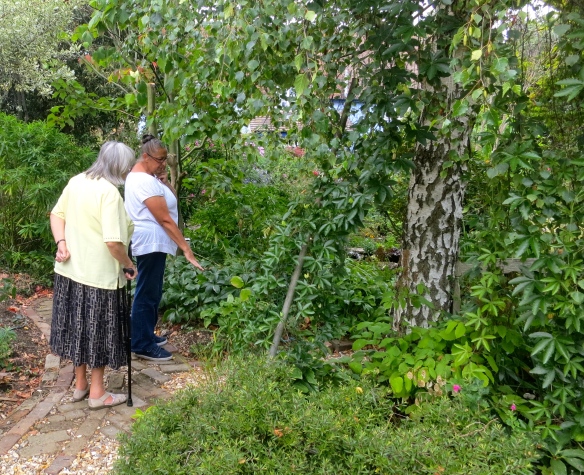
I accompanied Jackie giving Sheila a tour of the garden. 
 We have an even darker pink variety of Japanese anemone now in bloom, and the penstemons are flourishing.
We have an even darker pink variety of Japanese anemone now in bloom, and the penstemons are flourishing.
In addition to the jewellery Flo is spending her time making, she has started to produce wire animals, bringing all her natural skill in reproducing a wide range of creatures, perfectly proportioned and with life-like stances, in a variety of art forms. 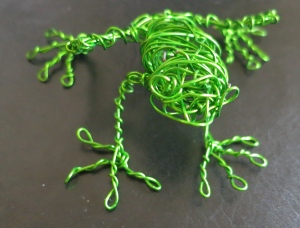 She used my camera to photograph a frog and e-mail it to a friend. She was very patient as I stumbled my way through explaining the the process on my iMac.
She used my camera to photograph a frog and e-mail it to a friend. She was very patient as I stumbled my way through explaining the the process on my iMac.
This evening we all dined on Jackie’s superb sausage casserole (recipe), mashed potato, and crisp vegetables, followed by jelly and ice cream. Lambrusco, Marquis de St.Vincent Medoc 2012, and Hoegaarden were the drinks on offer.
Tag: cricket
Lest We Forget
 It is Alice’s birthday today, so I will begin by displaying my iMac wallpaper on which she walks across the shingle on a very blustery day in view of the Isle of Wight and The Needles.
It is Alice’s birthday today, so I will begin by displaying my iMac wallpaper on which she walks across the shingle on a very blustery day in view of the Isle of Wight and The Needles.
 This morning I walked to the bank at New Milton. I turned right up Lower Ashley Road and left along Ashley Road. This route is rather less picturesque and more protracted than the winding racetrack that is Christchurch/Lymington Road, but considerably safer. The man who insisted on giving me a lift soon after I had passed Angel Lane on my return thought so too.
This morning I walked to the bank at New Milton. I turned right up Lower Ashley Road and left along Ashley Road. This route is rather less picturesque and more protracted than the winding racetrack that is Christchurch/Lymington Road, but considerably safer. The man who insisted on giving me a lift soon after I had passed Angel Lane on my return thought so too.
Downton’s public Telephone box has probably seen better days.
A grasshopper camouflaged in the long grasses through which I trampled on the verge took me back to A Close Encounter I experienced in Sigoules on 9th August 2012.
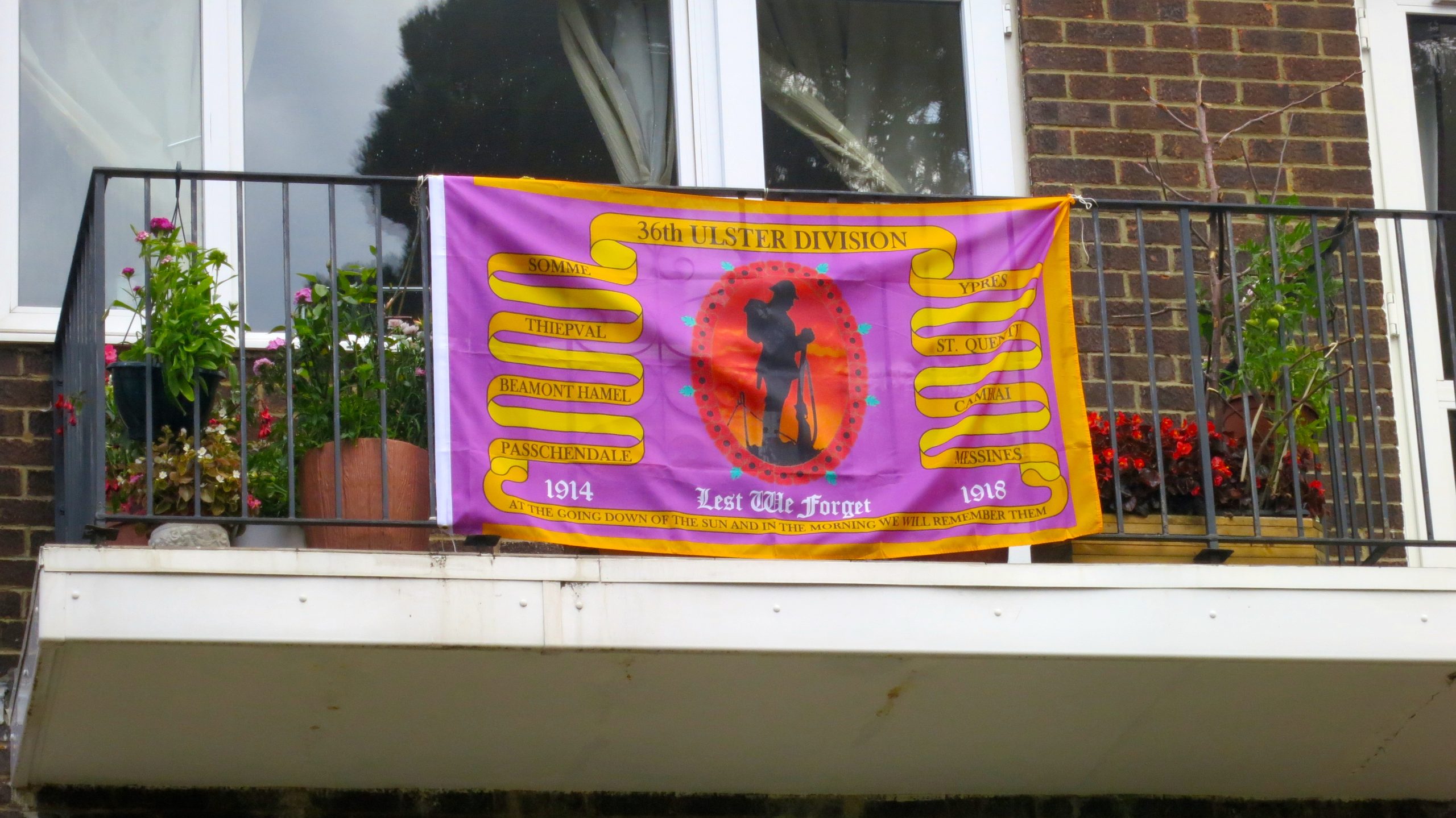 A memorial flag flapping on the top floor balcony of a block of flats in Ashley Road encouraged us to remember the 36th Ulster Division’s contribution to the First World War, which we joined 100 years ago today. This was just one group of the generation of young men and boys on both sides sent to their slaughter in order to satisfy the whim of a power-crazed Kaiser and the hopeless ineptitude of our own war leaders.
A memorial flag flapping on the top floor balcony of a block of flats in Ashley Road encouraged us to remember the 36th Ulster Division’s contribution to the First World War, which we joined 100 years ago today. This was just one group of the generation of young men and boys on both sides sent to their slaughter in order to satisfy the whim of a power-crazed Kaiser and the hopeless ineptitude of our own war leaders. 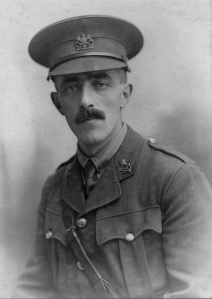 A century later we still fight our battles on foreign soil, to demonstrate that not much has been learned by mankind in the intervening century.
A century later we still fight our battles on foreign soil, to demonstrate that not much has been learned by mankind in the intervening century.
It is almost incredible to recollect that Kaiser Wilhelm was a grandson of Queen Victoria, and therefore that the major protagonists were a family at war.
My own paternal grandfather was one of those who came back, otherwise, since my father was born in 1917, when we think this photograph was taken, I probably wouldn’t be here to write this post. Neither would Alice, come to that.
When our lights are extinguished at 10 p.m. this evening, it will not be a power cut that brings this about. We will be joining the rest of the UK in an hour’s darkness of remembrance.
Back home this afternoon, while Jackie laboured with her watering cans,  I wandered around the garden, at one point taking a rest on the dump bench and admiring one of its views. I did a little dead heading on my rounds. Petunias are very sticky.
I wandered around the garden, at one point taking a rest on the dump bench and admiring one of its views. I did a little dead heading on my rounds. Petunias are very sticky.
 The nocturnal relative of this morning’s grasshopper, probably sleeping, aboard one of our many blue clematises was a cricket. Close scrutiny of the photograph reveals the incredibly long antennae that distinguish this insect from the other.
The nocturnal relative of this morning’s grasshopper, probably sleeping, aboard one of our many blue clematises was a cricket. Close scrutiny of the photograph reveals the incredibly long antennae that distinguish this insect from the other.
We think the purple clematis climbing the new arch on the opposite side of the garden is a Niobe.
Near this is a very prolific hibiscus.
Because we are likely to forget their names, Jackie is labelling all those plants, like the unusual crocosmia Solfoterre, that she can, sometimes after considerable research.
 Just as extensive research was required for me to identify a black and white striped butterfly that flashes it bright orange underside when on the wing. After a thorough study of the thoroughly informative ‘The Butterflies of Britain & Ireland’ by Jeremy Thomas and Richard Lewington, I surfed the web, to no avail. Then I had one of my strokes of genius. Maybe, I thought,’ it is a moth?’. One had, after all, the other day, settled on Jackie’s woolly bosom. It is a Jersey Tiger Moth. She was, incidentally wearing a cardigan at the time.
Just as extensive research was required for me to identify a black and white striped butterfly that flashes it bright orange underside when on the wing. After a thorough study of the thoroughly informative ‘The Butterflies of Britain & Ireland’ by Jeremy Thomas and Richard Lewington, I surfed the web, to no avail. Then I had one of my strokes of genius. Maybe, I thought,’ it is a moth?’. One had, after all, the other day, settled on Jackie’s woolly bosom. It is a Jersey Tiger Moth. She was, incidentally wearing a cardigan at the time.
For our dinner this evening, Jackie produced a professional egg fried rice to accompany our succulent pork chops and the remnants of our recent Chinese takeaway. I finished the Bordeaux and she sampled some Hoegaarden.
‘Get Two’
This morning I began reading Voltaire’s tale, ‘Le Taureau Blanc’, which translates as ‘The White Bull’. I doubt whether anyone of my generation can see such a title without thinking of Tommy Steele’s famous 1959 hit song ‘Lttle White Bull’ from the film ‘Tommy the Toreador’. Rather as with Adam Faith’s ‘What do you want?’, I have been known to burst into a vernacular rendition of it. Both these period masterpieces can be heard on Youtube.
The year after Tommy burst on the scene was my last one at Wimbledon College. In ‘No-one Forgets A Good Teacher’, I signposted the possibility of featuring Bryan Snalune.
I believe I stumbled upon a print containing his image today. He is probably on the viewer’s far right nearest the volleyball net. I think I am at the back of this court in jumper and tie. I’m amazed that so many in the picture wore ties. Bryan introduced the sport to the school, and brought in, I think Canadian, Air Force players to teach us the game. If they were American, I do apologise. He arranged a few fixtures for us. I have no idea how we fared.
This gentle giant, not much older than us, had that magic quality that demands respect whilst conveying equality as a human being. He was a lot of fun without losing his authority. I see his toothy smile and shock of fairish hair now. His subject was French, through which he guided me to A Level GCSE.
The smile mentioned above is probably indirectly responsible for my being awarded a punishment of two strokes of the ferula.
The ferula was the Jesuit version of the cane. A small, flat, slipper-like object consisting of leather with whalebone inside it, this was wielded by a punishment master not connected with whatever offence of which you had been guilty. ‘Two’ – one on each hand – was what was dished out to the little boys. If you were a recidivist and rather older you could progress to ‘Twice Nine’. But you wouldn’t want to.
Bryan Snalune was a keen amateur actor. During my group’s last weeks at school he performed in a play where his character was called Goofy. Clearly the casting director had also noticed the teeth. I cannot remember why, but I was not present at the performance, yet my classmates came back with this priceless information for a budding cartoonist. It felt natural to draw Walt Disney’s Goofy on the blackboard just before the French lesson.
Unfortunately our friendly teacher was not the next one to enter the room. Instead, Fr Strachan, S.J., the deputy headmaster found some reason to make a brief visit. Glancing at the familiar character depicted on the board, he said: ‘Who did that, Knight?’. Maybe he recognised my style. Although a decent enough man, Fr Strachan was not known for his sense of humour. On that day he displayed a rather quirky one. ‘Get two’. He proclaimed.
I don’t remember the name of the executioner, but I can see him now, a little round chap in holy orders whose beady eyes glinted behind his spectacle lenses. He was a little surprised at his prescribed task when I knocked on his door and extended my arms. My outstretched palms were at a level which put my fingers in danger of picking his nose. He, and I, were both even more surprised when, at each stroke, a wailing chorus set up an anguished howl in the corridor outside. Although my hands stung rather more than somewhat, I was able to open the door to encounter the whole of my class doubled up with laughter.
The year before this, when Tommy reigned in the cinemas, Bryan had managed the second XI cricket team of which he had appointed me captain. Roger Layet stands second from the left. In the teacher post highlighted above, I told how Moses came to know my name. It was for this team that the performance that brought me to his recognition was played. Bryan Snalune was the umpire. When five wickets had fallen, all to me for not many runs, ‘Take yourself off now’, he suggested sotto voce. He was the boss, so I did. Mind you, I doubt that his intervention as a supposedly neutral officiator was legitimate. When only two more had gone down and the game was, I thought, in need of my more direct involvement, I came back on and polished off the last three. Could that have been the day I would have taken all ten? I guess we’ll never know.
When you have determined on chilli con carne for dinner and you have run out of red kidney beans and live in the heart of the New Forest, you cannot nip round the corner for a tin. This means a drive out to stock up. And whilst you are there you might as well buy a few more things, which is what Jackie and I did. New Milton’s Lidl was the fortunate beneficiary of our custom this afternoon. En route through Downton we were not surprised to see that the The Royal Oak is closed and the business is To Let.
The above-mentioned chilli con carne was as delicious and appetising as usual. It came alongside savoury wild rice with sweetcorn and peas. Creme brûlée was to follow. Mine was accompanied by Llidl’s excellent value Bordeaux superieur 2012.
Now. In grave danger of yielding my laurels to my lady, I am honour bound to satisfy the desire of a valued reader. There are a number of fans who find the culinary codas to these posts of prime interest. I will therefore detail the method of preparation of tonight’s repast.
Like all creative cooks it is useless to ask Jackie for a recipe. Each meal is a work of art in progress, planned and often prepared in advance with the variable brushstrokes applied as she goes along. However, here goes:
For enough chilli for eight servings take:
4 medium onions, 4 bird eye chillis complete with seeds, 4 large or 6 medium cloves of garlic. All finely chopped, fry in a little oil and set aside;
Simmer 1 lb of lean minced beef with a Knorr beef cube (Oxo too salty) until tender;
Combine everything with a small packet of passata, a small tin of tomato puree and 2 tins of drained red kidney beans. Adding water if needed, simmer until all flavours combine in a nice, thick, sauce.
This comes with a warning. We like it hot. Some don’t. Adjust chilli content accordingly.
This particular rice is boiled.
8-10 oz of basmati with added wild rice (can be bought mixed in supermarkets). When half-cooked add the contents of a small tin of sweeetcorn, a handful of frozen peas and 4 good shakes of Maggi liquid seasoning.
Bon appétit.
In The Brearley Mould
As planned, yesterday lunchtime Jackie drove Flo, me and Scooby to Shelly and Ron’s for a most convivial lunch and afternoon which stretched into the early evening. A storm raged throughout the journey, the Modus wheels sending up high waves on either side as it disturbed the numerous pools across the country roads. Despite still recovering from a cold Shelly produced an excellent turkey and sweet leek pie inspired by Jamie Oliver. I was particularly impressed my the lightness of the pastry, which I gather is quite difficult to attain. Ron and I drank Malbec. I’m not sure what those with a preference for white wine enjoyed. An excellent apricot flan with ice cream and/or cream was to follow. Port, Madiera, coffee, and mints brought up the rear. Later came Christmas cake.
I had been misinformed about the likelihood of being prevailed upon to play Trivial Pursuit. Instead we played an hilarious game of Who?, What?, Where?. For those who, like me, haven’t come across this before, the idea is that each participant wears a cardboard hat into which is slipped a ticket with a person, object, or place inscribed thereon. The wearers, in order to establish their unseen identity, ask questions of the other players who may answer simply ‘yes’ or ‘no’. If the answer is in the affirmative the victim may ask another question; if in the negative, the next person in a clockwise direction has their turn. I was no better at this than I am at charades. It would have helped if I hadn’t assumed that the hats bore some relevance to what was written on the tickets. This, given that my hat was a deerstalker, caused me to waste two questions on Sherlock Holmes and Doctor Watson. I managed to establish that I was a person no longer alive, then forgot that I was defunct.
All in all, mine was not a great performance. That of Helen and Bill’s son John on the CD ‘John Eales Sings Christmas’, with which we were afterwards entertained, was somewhat better.
Fortunately Flo opted to spend another night with her grandparents, so we arrived home earlier than expected. It wasn’t until rather later that we managed a little cheese and biscuits, after which I read Giles Foden’s introduction to Benjamin Cowburn’s ‘No Cloak, No Dagger’.
Rob, the ‘general handyman’ engaged by Penyards, who is extremely reliable, effective, and efficient, visited this dry morning, and confirmed our diagnosis that the leak from above was a matter for estate management, who are contracted by all the residents and landlords to look after the property as a whole. Nevertheless, having been unable to gain access to the flat upstairs because no-one was in, Rob and his colleague obtained a ladder, mounted the balcony from the outside, and cleared a blocked gully. Once the fuses were replaced the underfloor heating could be turned on to no ill effect.
In ‘Did You Mean The Off Break?’, I wrote of my initiation into Wimbledon College Under 14s cricket team.  The team photograph taken in 1956 at a time when, at the end of the season, we had all reached fourteen, is number 40 in the ‘through the ages’ series. Give the Persil-washed condition of our whites, I imagine it must have been before the start of a game. Just in case anyone has trouble picking me out, I am third from the left of the viewer’s perspective in the back row. I believe fourteen was the age at which I became a permanent fixture of that particular row in group photographs. Next but one along stands Roger Layet, who I was, a year or so later, very pleased to persuade to play for Trinity Cricket Club. A correct, if somewhat painstaking batsman, Roger was an asset to any side.
The team photograph taken in 1956 at a time when, at the end of the season, we had all reached fourteen, is number 40 in the ‘through the ages’ series. Give the Persil-washed condition of our whites, I imagine it must have been before the start of a game. Just in case anyone has trouble picking me out, I am third from the left of the viewer’s perspective in the back row. I believe fourteen was the age at which I became a permanent fixture of that particular row in group photographs. Next but one along stands Roger Layet, who I was, a year or so later, very pleased to persuade to play for Trinity Cricket Club. A correct, if somewhat painstaking batsman, Roger was an asset to any side.
Iain Taylor, as captain, sits in the centre of the front row. As a captain and a cricketer, he was in the Mike Brearley mould. Both intuitive and insightful characters who could make friends easily, they managed their players extremely well, yet neither was particularly outstanding as a player. You may think I have a bit of a nerve to describe a man who could captain England (Brearley, not Taylor) in such a way. Brearley was, however, probably the most outstanding captain this country ever had. He could manage Ian Botham, for goodness sake. It was in the Brearley years that our greatest all-rounder – famously aided and abetted by Bob Willis, particularly at Headingley in 1981 – performed his most miraculous feats. Mike Brearley, indeed, a psychotherapist, was described by Australian opponent Rodney Hogg as having ‘a degree in people’. And Iain could manage us. He did, of course, recruit me, so his judgement must be sound.
On Ian’s right (from his perspective) sits Mike Miliffe. Mike was the batsman who succumbed to my bowling as described in the above-mentioned post. I was to learn, playing alongside him, how fortunate I had been to succeed against him in the nets.
Our skipper is flanked on his left by Bob Hessey. Bob was an outstanding fast bowler. His speed and accuracy was aided by an easy, athletic, run to the wicket and flowing action. I could have done with that.
Flo is still with us, as is my friend Tony who arrived this evening. He, Jackie and I dined at The Foresters Arms in Frogham. In the dark and rain, stepping out of the car and walking to the pub gate, we found ourselves treading on what seemed like hard round balls. On closer inspection they turned out to be Brussels sprouts, no doubt scattered for hungry ponies. Unusually for a Thursday evening, we were the only diners. This was no doubt because most people were partied out after the last few days. We received our usual warm and friendly welcome. Jackie and I enjoyed battered haddock and chips, whilst Tony chose sausages and mash. He abstained from dessert whilst Jackie and I partook of sticky toffee pudding and ice cream. I had a couple of glasses of Malbec; Tony drank Wadsworth’s 6X; and Jackie drank lager.
My First Match
Today Helen and Bill, and Shelly and Ron came for the afternoon and an evening meal. One of the underlights had blown, so we made another trip to Homebase at Edge End, for replacements. It seems that we need replacement bulbs or strip lighting on an almost weekly basis at the moment, and, although we always buy some spares as well, the next one we need is invariably of a different fitting or length from those we have in our expanding stock. This particular light was so old, probably thirty years, that the holder was stiff and brittle, and kept cracking and shedding bits. After unscrewing and taking it down, because we are both too tall to bend and peer underneath the cupboards, we were still at a loss. I was all for asking the agent to have these fittings changed. But Jackie wanted her kitchen today and was determined to see the job through. I left her to it.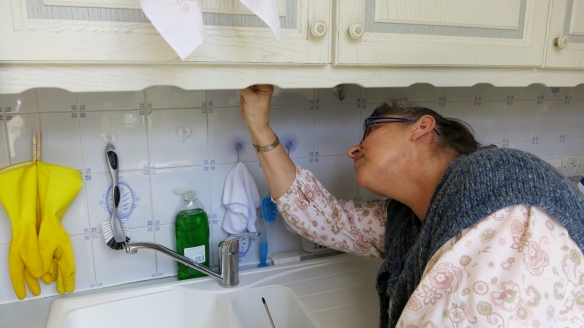 She fixed the tube in place and only needed my help to screw it back.
She fixed the tube in place and only needed my help to screw it back.
Before we left Shelly had phoned to check when they were expected because Ron, a cub master was taking his boys on a hike this morning. This led me to reflect on my own brief sojourn in the cubs. I hadn’t really wanted to join and only did so to please Auntie Gwen. It seemed to me that weekdays at school were where I experienced enough regimentation. So I always arrived late and mucked about a bit. What finally earned my expulsion by Akela, was chucking bits of screwed up paper at other boys when we were sitting round in some kind of circle for some purpose which I cannot remember. That was definitely a result. I must have been about nine.
But that was not quite the last of me and cubs. The Rowe family were friends of Dad’s. Dickie had emigrated to New Zealand after the war, but we still kept in touch with his sisters. One, Ivy, was an Akela. The adults had the bright idea that I might like to join her pack on a camping holiday. I remember three things about that trip. One was cherryade; a sweet, sickly fizzy drink that everyone was addicted to. The second was that I was so homesick that Mum and Dad had to come and take me home after three or four days. I think Dad used his furniture van for this, but I can’t be quite certain. Last, and most definitely not least, was an even more embarrassing experience than having to be fetched early. There was a cricket match. I had never played the game and knew nothing about it. There was no place for me in a team. ‘Never mind’, said the organiser of the event. ‘You can be umpire’.
I was placed behind the stumps at the bowler’s end. I stood there vaguely looking interested. My reverie was soon shattered by an awful cry, something akin to ‘aarwozeeee’. I stood there definitely looking red-faced and nonplussed. I did nothing. I said nothing. I saw nothing. I wished I’d heard nothing. ‘Put your finger up’, said one of the fielders. ‘Which one, and where?’, I thought. The other boy helped me out by indicating the correct procedure. So I put my finger up. Nervously. And got a tirade of tearful abuse from a batsman who then trudged off to the edge of the field. I cringe now as I think about it.
Early this afternoon I decided to tackle the internet problem once more. I turned on the iMac and phoned BT. There was a twenty minute wait. I made good use of this by reading the booklet that came with the Home Hub. This spoke of a ‘Wireless Key’ needing to be used. When speaking with Apple yesterday I realised I may be engaged with someone in America, who was not familiar with BT Hubs. He confirmed that it should be the BT Password that we had been using and had been reset. The word on the screen was ‘Password’. So what if I entered the Key instead of the password? I was in the process of doing this when an assistant became free. It worked. That must have been the quickest call she’d ever made.
Now I can’t even get e-mails on my laptop, being told my own account password is incorrect. I wasn’t going to start all over again today, so will ring BT tomorrow.
The purpose of the sisters’ visit was the grand rugbyfest. 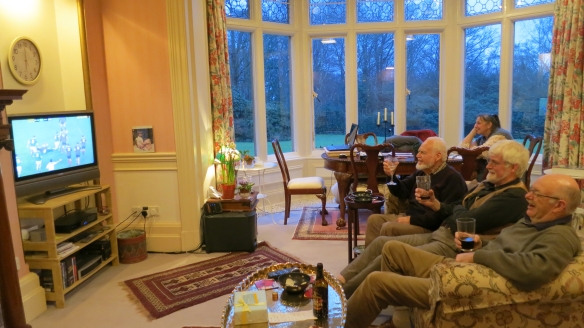 The three men watched the afternoon’s rugby while the women played Scrabble, with Jackie periodically attending to the meal. Jackie, Helen, and Shelly had realised they were each going to be rugby widows for the afternoon, so they decided it made sense to do it together.
The three men watched the afternoon’s rugby while the women played Scrabble, with Jackie periodically attending to the meal. Jackie, Helen, and Shelly had realised they were each going to be rugby widows for the afternoon, so they decided it made sense to do it together.
We then spent an enjoyable evening centred around a tender roast lamb dinner, followed by apple and blackberry crumble. Various red and white wines were drunk.
Cricket In The Street
This morning I walked to our landlords’ offices in Raynes Park to discuss our moving date. There was no-one in, so the conversation took place on mobile phones, which had not even been dreamt of when I was growing up in 29a Stanton Road, which has featured in a number of posts. Not wanting a wasted journey I continued along Kingston Road, walked under the railway arch and along Wyke Road to my childhood street.
 It was dahlia time in Maycross Avenue, and magpies were feasting on rich pickings found in roof guttering.
It was dahlia time in Maycross Avenue, and magpies were feasting on rich pickings found in roof guttering.
The meerkats featuring in Compare the market.com’s television advertisements must be one of the most successful marketing ideas ever. They have spawned numerous offspring which can be found in outlets all over the country. Garden centres love them.  Even the Metropolitan Police have used them to signal Neighbourhood Watch, several posters of which line my route. Neighbours in the Watch areas undertake to keep an eye on other properties in the street and raise the alarm if necessary. Net curtains must be quite useful there. These signs contain representations of the real thing, not the many different clothed characters which advertise the comparison site.
Even the Metropolitan Police have used them to signal Neighbourhood Watch, several posters of which line my route. Neighbours in the Watch areas undertake to keep an eye on other properties in the street and raise the alarm if necessary. Net curtains must be quite useful there. These signs contain representations of the real thing, not the many different clothed characters which advertise the comparison site.
On such a blustery day as this, empty recycle bins are apt to be blown all over the place. One lay in the middle of Kingston Road, requiring drivers to avoid it. I picked it up and placed it against a wall.  I had just passed the Emma Hamilton public house which is now home to a car wash enterprise. Pubs are closing at an alarming weekly rate throughout the UK. Many become Asian restaurants, some of which survive. These characterful old buildings often frequently change hands, presumably depending on whether or not their new owners have made a success of the alternative uses.
I had just passed the Emma Hamilton public house which is now home to a car wash enterprise. Pubs are closing at an alarming weekly rate throughout the UK. Many become Asian restaurants, some of which survive. These characterful old buildings often frequently change hands, presumably depending on whether or not their new owners have made a success of the alternative uses.
One of the few businesses which has thrived since my childhood in the ’40s and ’50s is the undertakers, the need for which will probably never die out.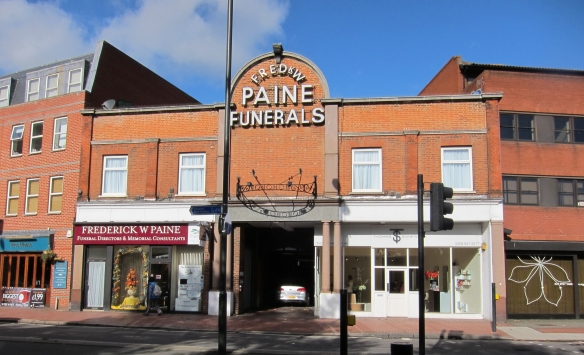 I will forever know this establishment, wherever I see its branches, as Frederick Window Pane. We children thought that in naming it we had been very witty.
I will forever know this establishment, wherever I see its branches, as Frederick Window Pane. We children thought that in naming it we had been very witty.
And so to 29a Stanton Road.  In those early years all the children played in the street. The presence of a car in this right-angled road was a very rare occurence. It was therefore perfectly safe, even to play ball games, which are now banned in London’s Council estates. Naturally we played cricket. The fence surrounding the large house across the road was a perfect surface on which to chalk the stumps. Jacqueline tells Jackie she always had to do the fielding, never being allowed to bat. My recollection is that she was always out first ball and we were too cruel to allow her the few lives we should have given her. If you hit the ball into a neighbour’s garden that was ‘six and out’, which means six runs were added to your score but you were out. We used an old tennis racquet and tennis balls, so it was rather difficult to keep the ball down, as I once learned to my cost. I broke an upstairs window of a house at the Worple Road end. The residents were on holiday, so we left a note. Despite this quite amazing display of honesty, the woman was extremely angry, telling me that at my age I should have known better. I was only nine, but she thought such a tall boy must be a teenager. My parents paid for the window repair.
In those early years all the children played in the street. The presence of a car in this right-angled road was a very rare occurence. It was therefore perfectly safe, even to play ball games, which are now banned in London’s Council estates. Naturally we played cricket. The fence surrounding the large house across the road was a perfect surface on which to chalk the stumps. Jacqueline tells Jackie she always had to do the fielding, never being allowed to bat. My recollection is that she was always out first ball and we were too cruel to allow her the few lives we should have given her. If you hit the ball into a neighbour’s garden that was ‘six and out’, which means six runs were added to your score but you were out. We used an old tennis racquet and tennis balls, so it was rather difficult to keep the ball down, as I once learned to my cost. I broke an upstairs window of a house at the Worple Road end. The residents were on holiday, so we left a note. Despite this quite amazing display of honesty, the woman was extremely angry, telling me that at my age I should have known better. I was only nine, but she thought such a tall boy must be a teenager. My parents paid for the window repair. The fence which bore our stumps has long since been replaced, and the number of parked cars demonstrates that our games would not be possible now.
The fence which bore our stumps has long since been replaced, and the number of parked cars demonstrates that our games would not be possible now.
Michael has a wonderful old sepia- coloured photograph of boys playing cricket down the centre of a street of back-to-back houses somewhere in the North of England. These ragamuffins were making their own fun, just as we did.
I wandered down the alley by the side of our old home which now gives directly onto the railway path that was fenced off in our day, requiring us to scale the obstacle in order to play there. I was able to clamber over rubble and bramble to peer over the garden fence and photograph the spot where I did battle with convulvulus and plum suckers (see 27th August), and Chris broke his leg. When my toddling younger brother had this mishap I went dashing upstairs to give Mum the news. ‘Don’t be so silly, he can’t have broken it’, she said, attempting to yank him to his feet. Indeed he had.
I was able to clamber over rubble and bramble to peer over the garden fence and photograph the spot where I did battle with convulvulus and plum suckers (see 27th August), and Chris broke his leg. When my toddling younger brother had this mishap I went dashing upstairs to give Mum the news. ‘Don’t be so silly, he can’t have broken it’, she said, attempting to yank him to his feet. Indeed he had.
I continued along the railway path (see 11th May), intending to walk to Wimbledon. A beautiful long-haired dog of a breed I didn’t recognise sped towards me barking excitedly. As a train passed I realised it was not I who had stimulated him. He stopped when the train had gone. I spoke to his elderly owner who said that his one pleasure in life was to chase the trains.
With half a mile to go the footpath was closed due to maintenance. I crossed the railway bridge into Merton Hall Road, thence left into Kingston Road and right into Mostyn where a mother was doing battle with a little girl who had just picked up a branched stick. Phrases like ‘it’s not ours’; ‘it’s got points on it’, and ‘it’s not a good toy’, were met with stubborn resistance in the form of shrieks and pulling away. I was momentarily relieved that that is all over for me. I returned to Links Avenue by my customary route.
This evening, after a big Lidl shop, we dined in Morden’s Superfish, an excellent traditional establishment where, with our crispy cod, chips and mushy peas, we quaffed Malandrino Pino Grigio 2010. A nice touch here is that a few prawns and crusty bread are served complimentarily.
Cottenham Park
On another cloudy morning I set off for Cottenham Park in what estate agents now call West Wimbledon.
In Maycross Avenue I met another elderly lady. I didn’t attempt to engage Dolly in conversation.
Further along I spotted another effort at accommodating both pansies and the motor car.
Arriving at Raynes Park, I walked up Amity Grove, past number 76, where Jackie and I had shared our first home together, and the Copleston’s house at 112.
The play area in Cottenham Park now occupies the site where I lost my fourteenth summer.
(Please bear with what follows, Judith).
I was playing cricket with some friends and no-one wanted to be wicket keeper. As a bowler I was no wicket keeper. However I nobly volunteered. I stood far too upright and far too close to the stumps. A wide ball came down the leg side (the side near the batsman’s legs, where it is difficult even for a more agile player to see the ball). I lost sight of it. Smack! A full-bodied strike straight off the bat sent the ball into my left eye. For the next three weeks the ball was not the only thing I lost sight of. Home in bed I was suddenly beset with excruciating toothache in that eye. In the days when GPs actually made home visits in the evening, our lovely Dr. Gallaghan, who worked himself so hard that he died of a heart attack in his forties, came out to see me. ‘How many fingers am I holding up?’ he asked, having placed one hand over my right eye. ‘How am I expected to know?’ I replied, ‘my eye is all swollen and closed.’ ‘It isn’t’, was his response. I still feel the cold sweat I immediately broke into on that warm summer evening.
Then it was straight to the Royal Eye Hospital in Surbiton where I spent the best part of the summer of ’56. Doris Day was top of the hit parade with ‘Qu’est sera sera?’. I wasn’t allowed to read, and so had to make do with the radio and the salacious comments of the man in the next bed involving me and the nurses. I didn’t know what he meant, but I did learn the song off by heart. As a child, I should have been in the children’s ward, but the beds weren’t big enough for me. For a few days, when the men’s ward became overcrowded, I was decanted to where I belonged. A box for my feet was placed at the foot of the bed. My feet were still attached to my legs.
When I came out of hospital, Gurney, the boy who had hit the ball, said: ‘You haven’t missed anything’. I could have killed him. The affected eye was always weaker, and, some fifteen years ago, I finally had an operation, for a cataract. Now it’s fine. I was first given specs at the age of eighteen. The optician told me that by the time I was sixty I wouldn’t need them any more. Rather rashly not taking into consideration that he was himself about that age, I said: ‘When I’m sixty I won’t care’. I felt rather embarrassed. And, of course, when I got to be sixty I did care.
The year after this I proudly became the opening bowler for Garrick House Cricket Club, which was soon to merge with Trinity (Battersea, now Oxley) Cricket club who used to play there.
With my sandals squelching across the sodden outfield I reflected that there can’t have been much play there this year.
On the North side of the park lies Melbury Gardens, where I watched the coronation of Queen Elizabeth II, on a miniscule television set. (See post of 27th. May.)
The modern sports pavilion, boasting showers and a bar, now lies on the site of the small hut which passed for a changing room. After the game, we would wash in a bowl of cold water, always allowing the oposition first go; then it was off to the Raynes Park Tavern for a jovial evening. It was into this hostelry’s small private bar that, at fifteen, I sneaked for my first half pint of beer. I didn’t like it much, but persevered, for the sake of male cameraderie. In those days Jackie helped the late Eileen Oxley; wife of Stanley, one of the three founders, in whose honour the club was renamed after his death; prepare the teas and do the scoring.
On the South side of the recreation ground lies Cambridge Gardens, which, on one memorable afternoon when I had first opened the batting for my club, I had peppered with boundaries. The despairing bowler said to Charlie Moulder, who was umpiring, ‘he bats like a number eleven (the last man in, who wasn’t usually much good with the bat)’. ‘He is a number eleven’, said Charlie. ‘And I keep feeding him’, bemoaned the bowler.
In my late teens, night after night, I played cricket with Mick Copleston. As we batted until we were out, continuing our innings the next evening, Mick would bat for weeks. Except when it was raining and we played billiards in his front room. He beat me at that too.
Today, walking back down Durham road, I passed the Ashby family home. They moved to London from Peterborough some time in the 1950s when we attended Wimbledon College. Chris and I were delegated by the masters at the school to look after the Ashby boys. After travelling under the Raynes Park Station railway arch I overheard a couple having an argument. ‘I ain’t fucking walking’, wailed the man. As a 163 bus, which would have taken me home to Links Avenue, passed me on Grand Drive, I rather thought he had a point. Continuing on alongside a playing field off this road I saw some boys settling themselves to play cricket. I fell in with one of their mothers who was walking her dog. Together we negotiated the soggy footpath.
This afternoon we were again treated to summer refreshment in the shape of a very windy, very heavy, rainstorm. Jackie drove us to Hampshire in the early evening and we dined at Eastern Nights before going on to The Firs.








